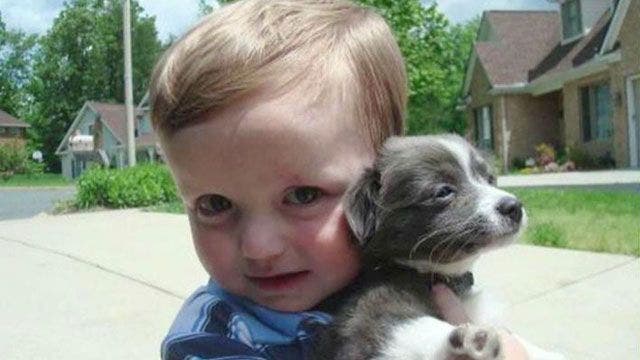
Seven-year-old Josh Hardy has survived four bouts of kidney cancer, heart failure and a bone marrow transplant. But now, he is fighting for his life once again, after a drug company denied him access to a medication that could cure him of a potentially deadly virus.
In an attempt to save her son’s life, Josh’s mother, Aimee Hardy, has launched a grassroots campaign to encourage drug manufacturer Chimerix to allow her son to have the medication he so desperately needs.
“I want to be by his bedside, holding his hand, telling him, ‘It’s going to be okay,’ but because of this unwillingness to release this drug, I have to leave him and come talk to you and it infuriates me,” Hardy, from Fredericksburg, Va., told Peter Johnson Jr. on Fox and Friends.
Josh had been cancer-free for two years when a bone scan in November 2013 revealed he had developed a bone marrow disorder as a result of his earlier cancer treatments. In January 2014, he underwent chemotherapy and a bone marrow transplant at St. Jude Children’s Research Hospital in Memphis, Tenn., but he subsequently developed adenovirus – an acute infection that can be deadly in people with compromised immune systems.
“Normally, Josh’s immune system would be able to handle the adenovirus if his immune system was set free,” Hardy wrote on her son’s CaringBridge.org page. “The challenge is his immune system can’t be set free yet because his body is still trying to adapt to the new bone marrow cells. So to keep the body from killing the new cells, they have to suppress the immune system, thus creating ideal conditions for adenovirus to advance. Catch 22.”
Doctors at St. Jude recommended Josh be treated with Brincidofovir – an antiviral drug that has been proven to clear up adenovirus in children within two weeks. However, Brincidofovir has not yet been approved by the FDA, so Josh hasn’t been able to gain access to the medication.
Chimerix, the company that manufactures Brincidofovir, has given hundreds of patients emergency access to the medication in the past, but they have since stopped this practice saying ‘they cannot afford it,’ according to Johnson Jr. However, Chimerix has received more than $72 million in federal funding to develop Brincidofovir.
“As we progressed to larger and more complex safety trials, we made the decision two years ago to stop the program and focus resources on earning FDA approval,” said Kenneth Moch, the CEO of Chimerix.
As Josh’s health continues to worsen, the Hardy family has launched a campaign to convince the company to allow Josh to receive the drug through a ‘compassionate use’ program – in which a drug company can allow a seriously ill patient to receive access to an unapproved drug.
“I feel that it’s just an excuse and we need them to totally change their stance, not only for us but for hundreds or even thousands of people that need [this drug],” Hardy told Fox and Friends. “…To me, [it’s] almost a crime to not make it available to everyone who needs it.”
Moch said his company has received hundreds of phone calls and emails in support of Josh. A Twitter campaign utilizing the hashtag #savejosh has also been launched to support Josh’s cause.
However, when Johnson Jr. asked Moch off camera if a visit to Josh’s bedside might help change his mind, Moch said it would not – much to the distress of Josh’s mother.
“He would see a frail little boy who has a very weak voice and has a hard time staying awake, because he’s in so much pain and to combat the pain he has to be on a lot of pain medication, so he’s drowsy,” Hardy said. “It’s horrible for us as parents to see, because he’s a vibrant, strong little boy, and even though he is frail, he has a very strong will about him. But things just keep stacking against him, and we just want to do everything we can to give him the opportunity to make a full recovery.”
To help save Josh, Hardy is encouraging supporters to call Chimerix at 919-806-1074; supporters can also e-mail compassionateuserequest@chimerix.com
SourcE: fox news


